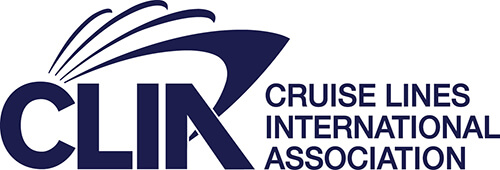What to Wear for Your Trip to Dubai
Wondering what to wear for your trip to Dubai?
Many of my clients already know what I’m about to say…. It depends.
It depends on when you’re going and what you’re going to be doing when you get there.
Whenever I get this question though, it actually warms my heart. It indicates to me that my travelers are mindful and want to be respectful of other peoples and cultures.
Emirati Dress
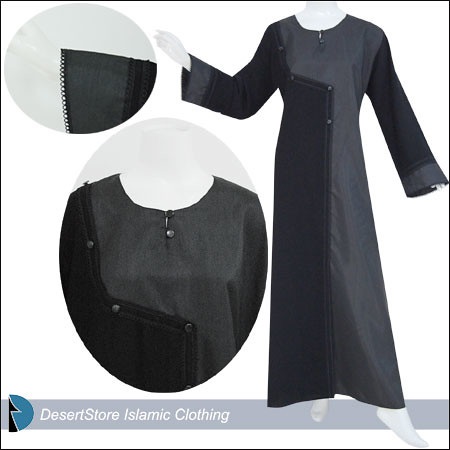
In the Emirati culture both men and women dress conservatively in public settings, typically covering their hair, knees and shoulders.
You may see Emirati men dressed in a long, single white robe called a kandura or dishdasha.
Emirati women may wear abayas, pictured to the left, over their street clothes. The abaya is a long flowing black gown that covers the whole body except the face, hands and feet.
And, according to Islamic religious customs, both men and women often choose to cover their heads. Women wear hijabs, and the headdress that men often wear is called a ghutrah.
This dress is customary but not compulsory in the United Arab Emirates. So neither locals, nor tourists, are required to dress this way.
Dubai welcomes millions of visitors annually from every part of the globe. These tourists will find that people in Dubai are relatively relaxed and open-minded when it comes to fashion. Although the United Arab Emirates is a Muslim country, the emirate of Dubai is very international and cosmopolitan. In fact, currently less than 12% of the population of Dubai is of Emirati descent.
Some travelers have reported that walking down the street in Dubai is almost like walking down the street in New York. You might see people wearing anything from suits and high fashion dresses, to shorts and tank tops to burqas.
When You're Going and What You're Doing
So, what should you wear as a tourist? Your days will likely be pretty long, as you try to fit in a variety of activities.
So, wear what makes you comfortable and what makes sense for the time of year that you are visiting, as well as the activities that you plan to do.
Dressing for Dubai Summer
Dubai summer months include April through October and are characterized intense heat. Temperatures can sometimes exceed 130 degrees Fahrenheit during the day.
In temperatures like this it’s best to wear comfortable loose-fitting clothes. You might also want to wear a hat and sunglasses to mitigate the sun. And you will certainly want to make liberal use of sunscreen.
Just like in the US, when it boiling hot like this, going into a museum or a restaurant where the air conditioning is blasting can be a shock to the system.
So, even though it may not occur to you when you’re packing, definitely don’t forget to take a thin jacket or a shawl for those air-conditioned spaces.
Dressing for Dubai Winter
Visiting Dubai during their winter from November through March is ideal, especially if intense heat is not your thing.
Don’t get me wrong, it will still be quite warm during the day. And, you will still need sunglasses and sunscreen.
But, in the evenings, it can get quite chilly. So, if you are packing for a winter trip, be sure to pack some jeans, jackets and sweaters for after the sun goes down. That night time Dhow Cruise you’re thinking of could possibly get chilly, so just be prepared.
Souks and Other Public Places
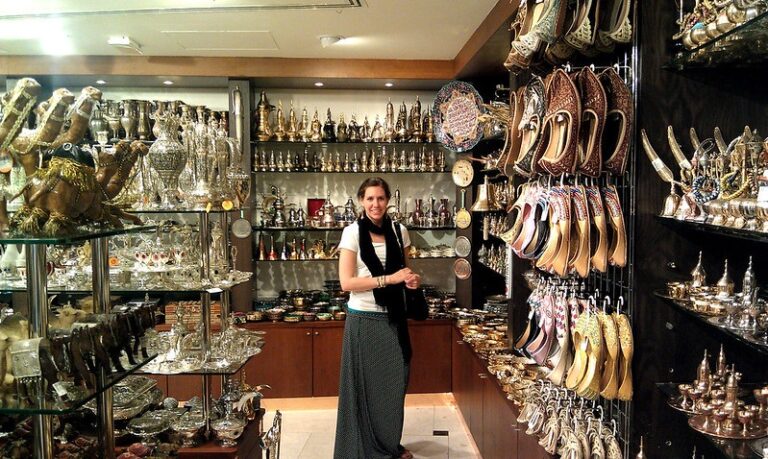
Some areas of Dubai are more conservative than others. While there is no particular dress code for public areas, it is best to dress modestly when visiting souks in the Old Dubai. Of course, you should avoid the obvious faux pas that might even garner you stares in the US like crop tops, too tight dresses, booty shorts, see-through or halter tops and wearing pants so low that your underwear is showing. But also, both men and women may want to cover their knees and shoulders. For this particular part of your trip you may want to stick to t-shirts and tops with sleeves and long pants, crop pants or long shorts or skirts that cover your knees.
Going to the Beach or Pool
Let loose at the beach. Well, maybe not too loose since topless or nude sunbathing is illegal in Dubai. But, when on the beach or at the pool, by all means rock those booty shorts if you want, wear that bikini, just maybe not the thong? Really, swimwear and beach clothes are perfectly fine at the beach and at the hotel pool. Just be sure to wear a cover up travelling back and forth to the beach or walking back and forth to your hotel room from the hotel pool. Ladies can perhaps cover your swimwear by wearing a maxi dress or a shirt and top. And while it’s ok for men to be bare-chested on the beach, while in transit you should wear a t-shirt and shorts.
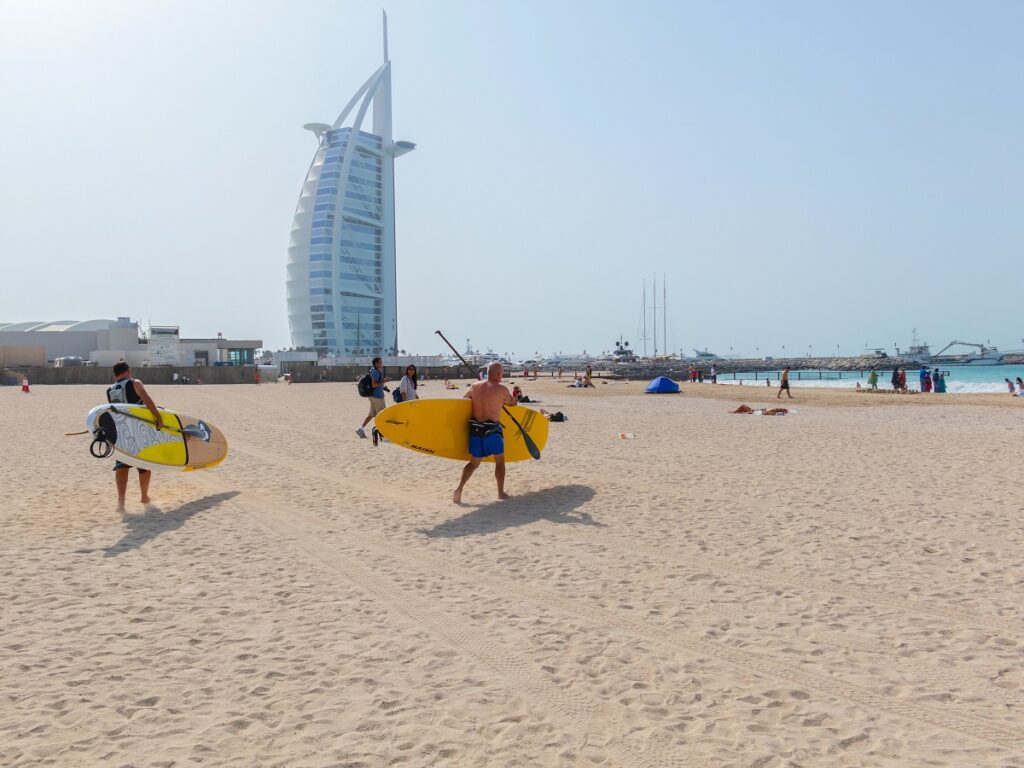
Taking a Desert Safari
If you’re headed out on a desert safari, one of the must do experiences in the UAE, wear or take your jeans. When the sun goes down the temperature goes with it. It can get quite cool. In addition to jeans you should carry a light jacket or sweater. For shoes it’s up to you. Flip flops, sandals or sneakers could work. Depends on how you feel about the desert sand.
Restaurants
Some 5-star restaurants may have a dress code. Many of them require men to wear long pants, dressy shirts and closed toed shoes. It’s best to check the restaurant’s website or call them before you go to dine. But for the most part there is no written or precise dress code for dining out at restaurants. Here, just as in many other public places, modest dress rules the day. To be clear, modest dress means no knees, cleavage or shoulders showing.
Mosques
There are only three mosques in Dubai that allow visitors. If you do pay a visit to one of these mosques you must strictly adhere to the dress code. To enter, you must cover yourself from head to toe. The good news is that if you are underdressed, it possible that the mosque you are visiting might provide you the attire that you need.
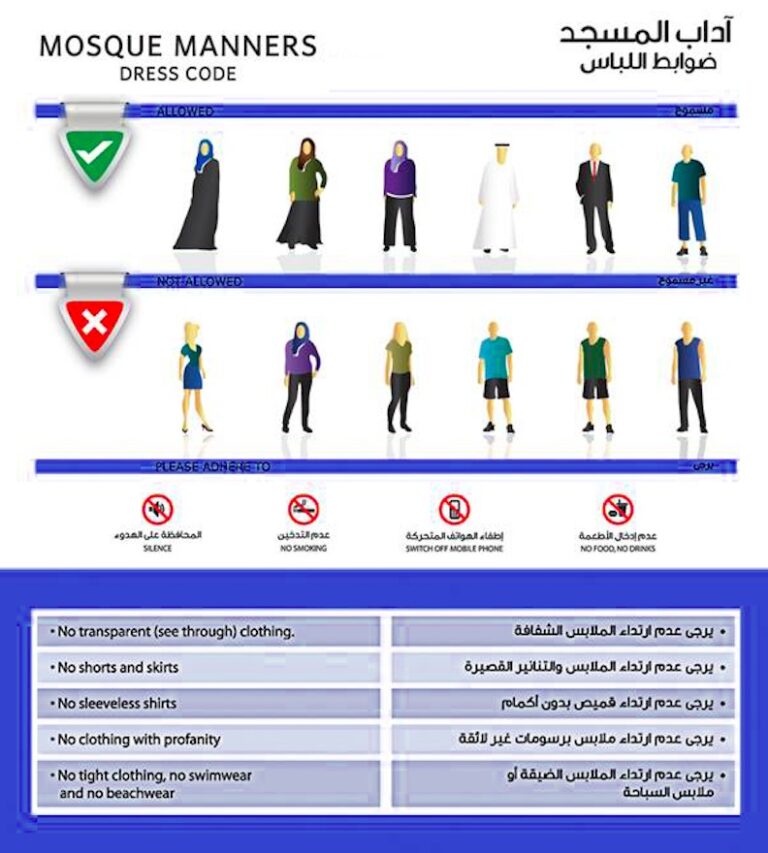
Religious Holidays
While as I mentioned that Dubai is pretty lenient when it comes to dress, you should make a special effort to dress conservatively if you happen to be visiting Dubai during Ramadan. Ramadan is the ninth month on the Islamic calendar. It is considered a holy month of prayer fasting, and introspection. You don’t need to cover your hair but be sure to cover your knees and shoulders. Tourists don’t need to fast but, out of respect for those who are fasting, you should not to eat or drink in public during the daylight hours. You will be able to eat and drink what you like within your hotel room, and also at designated restaurants. You may also find food being served to those who are not fasting in various designated areas of theme parks or other tourist entertainment establishments.
If you’re planning to travel to Dubai to explore the deep, rich cultural history of this modern cosmopolitan city, then contact a knowledgeable travel consultant at Enlighten Excursions.
If you’re already book and ready to go remember that Dubai is not extremely strict when it comes to dress code. And the people are genuinely welcoming, courteous, and hospitable. Just keep in mind when you’re packing your bags that the Emirati culture is conservative and deeply rooted in tradition and religion, so that you can be as respectful as possible of the culture.



